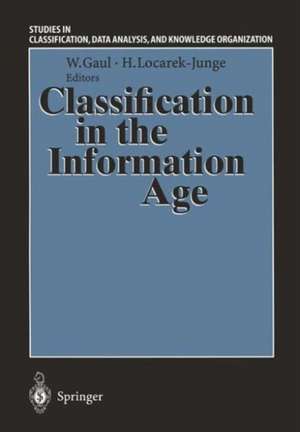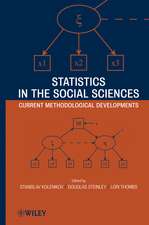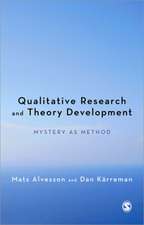Classification in the Information Age: Proceedings of the 22nd Annual GfKl Conference, Dresden, March 4–6, 1998: Studies in Classification, Data Analysis, and Knowledge Organization
Editat de Wolfgang A. Gaul, Hermann Locarek-Jungeen Limba Engleză Paperback – 16 iul 1999
Din seria Studies in Classification, Data Analysis, and Knowledge Organization
- 20%
 Preț: 754.09 lei
Preț: 754.09 lei - 20%
 Preț: 1203.30 lei
Preț: 1203.30 lei -
 Preț: 389.49 lei
Preț: 389.49 lei - 20%
 Preț: 587.28 lei
Preț: 587.28 lei - 18%
 Preț: 886.26 lei
Preț: 886.26 lei - 15%
 Preț: 654.43 lei
Preț: 654.43 lei - 18%
 Preț: 968.30 lei
Preț: 968.30 lei - 18%
 Preț: 1017.26 lei
Preț: 1017.26 lei -
 Preț: 417.41 lei
Preț: 417.41 lei - 18%
 Preț: 1113.09 lei
Preț: 1113.09 lei - 15%
 Preț: 645.14 lei
Preț: 645.14 lei - 15%
 Preț: 660.04 lei
Preț: 660.04 lei - 20%
 Preț: 583.37 lei
Preț: 583.37 lei - 15%
 Preț: 637.59 lei
Preț: 637.59 lei -
 Preț: 406.05 lei
Preț: 406.05 lei - 20%
 Preț: 997.38 lei
Preț: 997.38 lei - 18%
 Preț: 958.07 lei
Preț: 958.07 lei - 18%
 Preț: 949.06 lei
Preț: 949.06 lei - 18%
 Preț: 784.13 lei
Preț: 784.13 lei - 20%
 Preț: 999.53 lei
Preț: 999.53 lei - 18%
 Preț: 1391.52 lei
Preț: 1391.52 lei - 15%
 Preț: 657.25 lei
Preț: 657.25 lei - 18%
 Preț: 962.35 lei
Preț: 962.35 lei - 15%
 Preț: 649.71 lei
Preț: 649.71 lei - 20%
 Preț: 1013.06 lei
Preț: 1013.06 lei - 15%
 Preț: 652.81 lei
Preț: 652.81 lei - 15%
 Preț: 647.73 lei
Preț: 647.73 lei - 20%
 Preț: 585.29 lei
Preț: 585.29 lei - 24%
 Preț: 795.77 lei
Preț: 795.77 lei - 20%
 Preț: 1464.66 lei
Preț: 1464.66 lei - 20%
 Preț: 559.43 lei
Preț: 559.43 lei - 15%
 Preț: 647.59 lei
Preț: 647.59 lei - 15%
 Preț: 650.04 lei
Preț: 650.04 lei - 15%
 Preț: 647.73 lei
Preț: 647.73 lei -
 Preț: 398.15 lei
Preț: 398.15 lei - 20%
 Preț: 572.08 lei
Preț: 572.08 lei - 15%
 Preț: 639.59 lei
Preț: 639.59 lei - 15%
 Preț: 683.40 lei
Preț: 683.40 lei - 15%
 Preț: 695.01 lei
Preț: 695.01 lei -
 Preț: 423.34 lei
Preț: 423.34 lei - 18%
 Preț: 945.30 lei
Preț: 945.30 lei - 15%
 Preț: 652.64 lei
Preț: 652.64 lei -
 Preț: 391.40 lei
Preț: 391.40 lei - 20%
 Preț: 561.11 lei
Preț: 561.11 lei - 20%
 Preț: 1002.67 lei
Preț: 1002.67 lei - 15%
 Preț: 640.37 lei
Preț: 640.37 lei - 20%
 Preț: 996.88 lei
Preț: 996.88 lei - 20%
 Preț: 1007.46 lei
Preț: 1007.46 lei - 15%
 Preț: 646.11 lei
Preț: 646.11 lei
Preț: 964.10 lei
Preț vechi: 1175.73 lei
-18% Nou
Puncte Express: 1446
Preț estimativ în valută:
184.48€ • 193.13$ • 152.65£
184.48€ • 193.13$ • 152.65£
Carte tipărită la comandă
Livrare economică 07-21 aprilie
Preluare comenzi: 021 569.72.76
Specificații
ISBN-13: 9783540658559
ISBN-10: 3540658556
Pagini: 624
Ilustrații: XII, 608 p. 46 illus.
Dimensiuni: 170 x 244 x 33 mm
Greutate: 0.98 kg
Ediția:Softcover reprint of the original 1st ed. 1999
Editura: Springer Berlin, Heidelberg
Colecția Springer
Seria Studies in Classification, Data Analysis, and Knowledge Organization
Locul publicării:Berlin, Heidelberg, Germany
ISBN-10: 3540658556
Pagini: 624
Ilustrații: XII, 608 p. 46 illus.
Dimensiuni: 170 x 244 x 33 mm
Greutate: 0.98 kg
Ediția:Softcover reprint of the original 1st ed. 1999
Editura: Springer Berlin, Heidelberg
Colecția Springer
Seria Studies in Classification, Data Analysis, and Knowledge Organization
Locul publicării:Berlin, Heidelberg, Germany
Public țintă
ResearchCuprins
Plenary and Semi Plenary Presentations.- Classification and Information.- Scientific Information Systems and Metadata.- Multiple Expert Fusion.- How To Make a Multimedia Textbook and How to Use It.- Clustering and Neural Network Approaches.- Data Model and Classification by Trees.- A Framework for the Design, Development and Evaluation of Multimedia Based Learning Environments: ”ISTOS: An Application in the Computer Networking Domain”.- Natural and Constrained Classification of Data by Fuzzy Clustering Techniques.- Finance and Risk.- From Variance to Value at Risk: A Unified Perspective on Standardized Risk Measures.- Does the Planning Horizon Affect the Portfolio Structure?.- Statistical Approach in Financial Risk Analysis and Management — Review of Concepts.- Classification and Related Aspects of Data Analysis and Learning.- Classification, Data Analysis, and Statistics.- On Data-Based Checking of Hypotheses in the Presence of Uncertain Knowledge.- Multivariate Directional Tests with Incomplete Data.- Classification and Positioning of Data Mining Tools.- Hazard Rate Estimation from Censored Data.- A Sequential Modification of EM Algorithm.- Analysis of the Stability of Clusters of Variables via Bootstrap.- Models and Methods for Clusterwise Linear Regression.- Statistical Clustering Under Distortions: Optimality and Robustness.- Discrete Scan Statistics for Detecting Change-points in Binomial Sequences.- Dynamic Confinement, Classification, and Imaging.- Approximation of Distributions by Sets.- Computation of the Minimum Covariance Determinant Estimator.- Graphical Tools for the Detection of Multiple Outliers in Spatial Statistics Models.- Classification for Repeated Measurements in Gaussian and Related Populations.- Optimal vs. Classical Linear DimensionReduction.- Testing for the Number of States in Hidden Markov Models with Application to Ion Channel Data.- ClustanGraphics3: Interactive Graphics for Cluster Analysis.- Conceptual Analysis and Learning.- Conceptual Meaning of Clusters.- Group Theoretical Structures for Representing Data Contexts.- The Comparative Efficacy of Some Combinatorial Tests for Detection of Clusters and Mixtures of Probability Distributions.- Efficient State-Space Representation by Neural Maps for Reinforcement Learning.- Match-Gaphs of Random Digraphs.- An Improved Training Method for Feed-Forward Neural Networks.- Decision Support By Order Diagrams.- Neural Network Classification in Exponential Models with Unknown Statistics.- Conceptual Landscapes of Knowledge: A Pragmatic Paradigm for Knowledge Processing.- Usage of New Media and the Internet.- Information Systems, Multimedia, and WWW.- Remote Data Analysis Using Java.- Metrics for World Wide Web Information Systems.- Modeling Concepts for Flexible Workflow Support.- Navigation and Classification on the Internet and Virtual Universities.- Visualization and Categorization of Cached Hypermedia Data.- Virtualization of Course Structures Through Adaptive Internet Techniques.- Navigation in Cyberspace Using Multi-Dimensional Scaling to Create Three-dimensional Navigational Maps.- Structured Documentation. An Approach to Identify and Model Knowledge Components for Learning Purposes.- Applications in Economics.- Finance, Capital, and Risk Management.- Measurement of the Probability of Insolvency with Mixture-of-Experts Networks.- An Application of Methods of Multivariate Data Analysis to Compare Different Approaches to Exchange Rate Forecasting.- Intelligent Software Agents: Current Technology and Potential Impact on Electronic Markets and Intermediaries.- Clustering of Stocks in Risk Context.- Measuring Risk in Value-at-Risk Based on Student’s t-Distribution.- Using ANN to Estimate VaR.- Forecasting Discretized Daily USD/DEM Exchange Rate Movements with Quantitative Models.- Study Major Choice — Factor Preference Measurement.- What is “Incentive Compatibility”?.- Marketing and Market Research.- An Integrative Approach for Product Development and Customer Satisfaction Measurement.- Market Segmentation and Profiling Using Artificial Neural Networks.- A Classification Approach for Competitive Pricing.- Panel-Data Based Competitive Market Structure and Segmentation Analysis Using Self-Organizing Feature Maps.- Analysis of A Priori Defined Groups in Applied Market Research.- Modeling and Measuring of Competitive Reactions to Changes of Marketing Mix at the Retail Level.- Applications in Archeology, Bioinformatics, Environment, and Health.- Bayesian Statistics for Archaeology.- Investigating Information Retrieval with the Environmental Thesaurus of the Umweltbundesamt.- Data Mining with a Neuro-Fuzzy Model for the Ozone Prognosis.- Attributing Shares of Risk to Grouped or Hierarchically Ordered Factors.- New Hypotheses and Tests for the Multivariate Bioequivalence Problem.- Diagnostic Support in Allergology Using Interactive Learning Classifier Systems.- On Nonparametric Repeated Measures Analysis of Variance.














